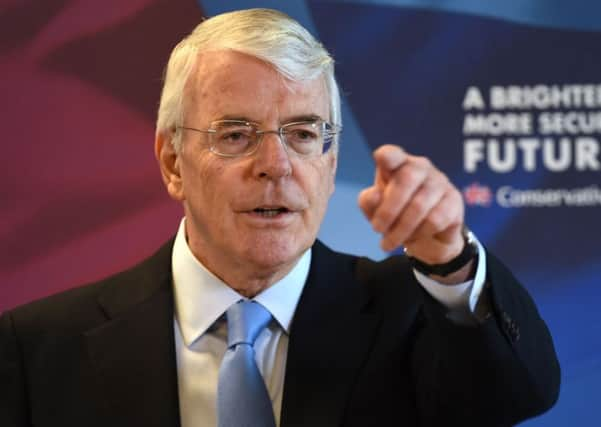Jason McCartney: A proud role in preventing genocide as John Major stood up for humanity


I spent time out on patrol visiting villages in the Zakho area of Kurdistan Region just over the border. Our job was to reassure Kurds that RAF and other jets overhead were friendly and would not be dropping sarin or mustard gas on them.
I was there thanks to a policy pioneered by Sir John Major and which is one of his most important contributions to post-Cold War foreign policy.
Advertisement
Hide AdAdvertisement
Hide AdFaced with widespread public outrage at the images of Kurds in their teeming thousands starving and freezing to death in the mountains, and on the basis of his own strong beliefs, our then Prime Minister bit the bullet and spearheaded moves to establish a no-fly zone over the Kurdistan Region.
This week is the 25th anniversary of the UN Security Council Resolution that enabled the no-fly zone, which protected the Kurds’ safe haven for another 12 years. Our aircraft patrolled the skies over Kurdistan and successfully prevented Iraqi leader Saddam Hussein from launching airstrikes against Kurdish men, women and children.
It was a vital humanitarian action that changed the practice and theory of international relations.
The immediate impact was to save the Kurds from probable continued genocide, which was wonderful for the very many lives saved and which allowed the Kurds in Iraq to build a decent and still developing state that is now one of our most important allies in the Middle East.
Advertisement
Hide AdAdvertisement
Hide AdSir John visited the Kurdistan Region in 2011 and was left in no doubt that he was widely respected for his actions. Thanks to Major and then Tony Blair, we are seen as vital partners, politically, culturally, and commercially.
My Conservative colleague, Nadhim Zahawi, whose parents are Kurdish and who fled Saddam’s Iraq in the 1960s, is a key lynchpin of the new relationship and is this week supporting the Globe Theatre in taking Shakespeare to Kurdistan. It helps that he is the MP for Stratford upon Avon.
Sir John could have had little idea of the longer term importance of his decision, but this anniversary should allow reflection on the Kurds as a positive factor in the Middle East.
I returned to the Kurdistan Region a couple of years back as a member of the all-party Parliamentary group on the Kurdistan Region, which I have now chaired since the 2015 election.
Advertisement
Hide AdAdvertisement
Hide AdI have seen a country at different stages of its journey to modernity.
The Kurdistan I saw in the 1990s was poor but proud. The Kurdistan I saw more recently had gone further and faster than anyone could then have expected.
It has gone into reverse recently thanks to the war waged by Daesh, which came close to capturing its capital Erbil in 2014. They were repulsed, and British and other airstrikes were and are vital to that.
They now face a major economic crisis. I am sure they will overcome it, but need further help to tackle both the immediate crises caused by Daesh and the longer-term problem of their older and now dysfunctional economic model, which relies too much on the state and revenues from one commodity, oil.
Advertisement
Hide AdAdvertisement
Hide AdI am also aware of the longer British involvement with the Kurds as we near the centenary of the Sykes-Picot agreement of 1916, which eventually helped deny Kurdish nationhood and put the Kurds into a cold house called Iraq.
The jury is out on whether Iraq can survive as a unitary state or whether some new dispensation is needed. But for me personally and for the Kurds, all was changed, changed utterly when Sir John Major decided to wield British and then international power to save the Kurds.
Jason McCartney is the Colne Valley MP and chairman of the All Party Parliamentary Group for the Kurdistan Region.